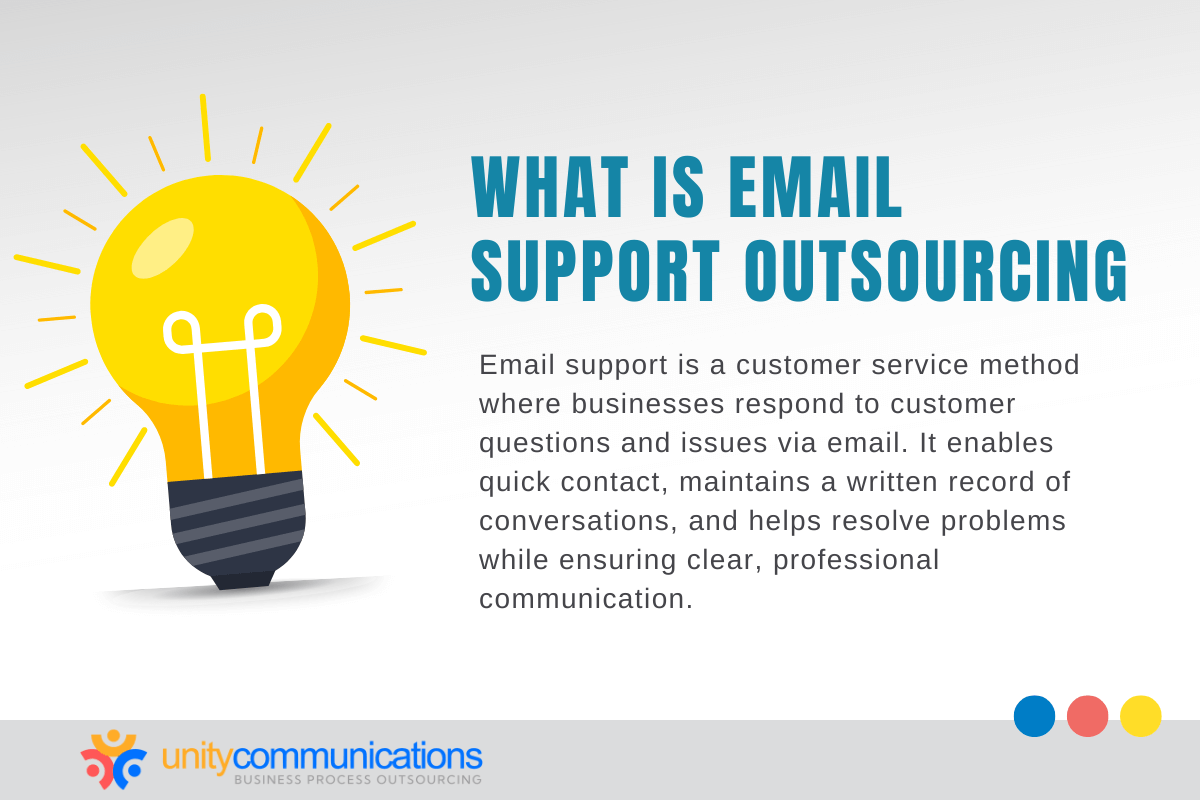IN THIS ARTICLE
Table of Contents
Email support is more crucial than ever. With a growing number of customers preferring email as their primary contact method, mastering this channel can boost satisfaction and loyalty.
Providing clear, timely, and effective responses is critical to outstanding email support. Business process outsourcing (BPO) is pivotal, offering specialized expertise and advanced tools to elevate your services.
Read on to learn about why and how to outsource email support services! This guide explores outsourcing, its transformative impact, and the strategies involved in ensuring success.
Understanding email support services

Email support services are essential to today’s customer care strategies because they allow your business to connect conveniently and effectively with customers. Whether you’re a small business or a large enterprise, knowing the complexities of email support improves your front-end operations and contributes to exceptional customer service.
Keep reading to learn more about email support, the types of services it covers, and the primary features that make it effective.
What is email support?
Email support is a customer service approach in which your firm responds to consumer inquiries, concerns, and requests via email. It lets customers contact you quickly and keeps a written record of all conversations.
This assistance channel is crucial for problem resolution, information dissemination, customer satisfaction, and an organized and professional communication flow.
Below are the types of email support services:
- Customer inquiry handling. The essential function of email support is to answer general consumer questions and requests regarding products, services, and company policies. Efficient inquiry handling improves customer satisfaction. Quick, accurate replies can satisfy their expectations and build confidence in your business.
- Technical support. Tech assistance via email involves helping consumers with product-related technical concerns. This service requires a competent team to provide clear instructions and solutions for tricky issues. Email works well for tech support because it allows for extensive explanations and step-by-step guides that end users can refer to.
- Order processing and updating. Another critical function of email support is managing order processing and updates, such as order confirmations, shipping notifications, and status changes. This type boosts customer experience, lowers purchasing anxiety, and increases brand confidence.
- Complaint resolution. Promptly, professionally, and consistently managing customer concerns includes acknowledging the issue and proposing solutions. A swift, effective complaint resolution turns unhappy buyers into loyal customers, making them feel valued and maintaining your positive brand image.
Primary features of effective email support
To guarantee that your email support service is effective and matches customer needs, it should include the following critical features:
- Timeliness. Customers expect to receive timely responses to their emails. An effective email support system responds to queries within 24 hours. Automated technologies can send acknowledgment messages and set defined response time to improve customer experience.
- Personalization. Customers appreciate tailored responses, which make them feel appreciated and significant. Using the customer’s name and adapting responses to their concerns demonstrate your organization’s concern about their needs. Personalization significantly increases consumer happiness and loyalty.
- Clarity and conciseness. Emails should be clear, simple, and easy to read, so avoid jargon. Clear and straightforward responses guarantee customers can quickly grasp the needed details. Using numbered steps or bullet points can make complicated subjects quicker to understand.
- Empathy. Sensitivity in your responses helps build rapport with the customer. Recognize their concerns, convey your understanding, and inform them that you are fixing the issue. Empathy can turn a potentially unfavorable encounter into a positive one, promoting consumer loyalty.
- Consistency. Maintaining a unified tone and message across all customer encounters is critical to building reliability and confidence in your brand. It also promotes a consistent client experience that builds long-term customer trust.
- Extensive solutions. Comprehensive answers to concerns lessen the need for follow-up questions and reduce customer frustration. Anticipating additional questions and providing pertinent information in your responses display thoroughness and skill, increasing customer fulfillment.
- Follow-up. Verifying you have satisfactorily addressed a customer’s concern shows your commitment to their happiness. A simple follow-up email reinforces a pleasant experience while encouraging further interactions or engagement, resulting in long-term customer connections and increased brand loyalty.
Benefits of outsourcing email support services

Outsourcing email support is an excellent choice for firms looking to boost productivity and save costs. Companies can improve customer service by leveraging BPO services. But what is BPO, and what is email support outsourcing?
BPO is the strategy of working with a third-party contractor, typically with nearshore and offshore operations, to handle essential non-core duties. In email support outsourcing, you delegate email management to a BPO partner.
The outsourcing vendor then utilizes its expertise and resources to manage relevant tasks, ensuring better performance, efficiency, and customer satisfaction. This allows your company to spend more time and effort on core competencies.
Here’s how outsourcing works to your advantage:
Cost savings
Outsource email support services and save money through:
- Reduced operating expenses. Outsourcing decreases the costs of employing, training, and keeping an in-house support workforce. This covers pay, benefits, office space, and tech infrastructure. Many BPO companies have lower overhead expenses and pass on the cost savings to their clients.
- Minimized infrastructure spending. Outsourcing email support decreases the need to purchase and maintain expensive technology and software. Nearshore or offshore BPO companies invest in reliable, updated systems that efficiently manage massive amounts of emails.
- Variable pricing. Outsourcing provides adjustable pricing so that organizations only pay for the services they utilize. This flexibility is advantageous during fluctuating email volumes, such as seasonal spikes or promotions. Companies can adjust their support services without incurring more fixed costs.
Improved response time
Outsourcing email support substantially enhances response time in the following ways:
- Faster turnaround. Dedicated email support teams have the resources and skills to handle requests effectively. Customers get faster responses, enhancing their overall experience and reducing dissatisfaction caused by long wait times.
- Extended support hours. Many outsourcing firms provide 24-hour support, allowing your company to cater to a global consumer base. Extended support hours mean customers receive prompt assistance regardless of time zone, improving your organization’s responsiveness and customer focus.
- Priority handling. Outsourced email support teams frequently use advanced ticketing systems and prioritize tactics that efficiently monitor and resolve requests. This approach promotes the timely resolution of critical concerns.
Enhanced customer satisfaction
When you outsource email support services, you raise customer happiness due to your BPO partner’s competencies:
- Professional expertise. BPO enterprises deploy skilled agents to assist customers. These trained and experienced third-party professionals can manage problems successfully and deliver accurate, valuable responses, improving the quality of support and customer satisfaction.
- Consistent communication. Reliability during interactions is essential for sustaining customer trust. Outsourced email support staff adhere to predetermined standards and guidelines to deliver effective customer engagement. This uniformity contributes to a trustworthy brand image and develops positive customer connections.
- Comprehensive solutions. Many BPO vendors have access to advanced tools and resources to provide extensive solutions to customer inquiries. By delivering thorough and well-rounded responses, these teams can address customer concerns effectively, reduce the need for follow-up communications, and improve overall satisfaction.
Scalability and flexibility
Outsource email support services and achieve scalability and flexibility. Here’s how:
- Readily scalable operations. One primary advantage of outsourcing email support is adjusting processes based on business requirements. Whether you’re dealing with more emails or planning to expand support services, your outsourcing partner can effortlessly adapt its resources and team size to meet the demand.
- Adaptable business shifts. Outsourcing enables your company to respond to changing market conditions and company needs. Whether it’s releasing new products, entering new markets, or modifying support methods, outsourcing firms can quickly adapt to keep email support successful and aligned with your objectives.
Impact of outsourcing email support on customer experience

What is customer support experience, and how does it relate to email support outsourcing? Customer support experience refers to a customer’s satisfaction with their interaction with your assistance services.
Outsourcing email support improves this experience in the following ways:
Enhanced quality of support
Outsourcing email support is delegating customer requests to specialists who excel in handling specific inquiries. This skill translates into higher-quality solutions because these individuals have been trained to address different issues clearly and accurately.
- Example: A technology startup outsources its email support to a third-party vendor specializing in answering technical issues. Customers receive thorough and accurate responses, increasing trust and confidence in the company’s services.
Access to advanced technology
When you outsource email support services, your business can access cutting-edge solutions that improve the customer support experience. These include modern ticketing systems and extensive analytics platforms.
- Example: A financial services firm delegates email support to a BPO company that can manage urgent inquiries and automate routine responses. The technology simplifies support operations and provides accurate and timely information to customers.
Personalized customer interactions
Outsourcing companies frequently utilize advanced platforms to manage customer interactions and gather deep insights into consumer profiles. The data helps personalize solutions, leaving clients feeling appreciated and understood.
- Example: A luxury company outsources email support to improve personalization. The support team uses consumer data to tailor recommendations and responses, boosting engagement, revenue, and repeat business.
Consistent support across channels
Partnering with a BPO provider ensures consistent service across communication channels. This uniformity helps maintain a dependable brand reputation and allows customers to have the same excellent experience regardless of how they contact your business for assistance.
- Example: An international airline subcontracts email support to deliver consistent service across multiple regions. Customers receive the same high-quality service whether they reach the airline by email, phone, or social media.
Focused expertise on complex issues
Outsourcing provides the unique expertise required to resolve complex challenges. This is especially advantageous for organizations dealing with technical products or services that require extensive support.
- Example: A healthcare organization transfers its email support to a BPO firm. This decision enables them to handle complex health-related issues with sensitivity and accuracy, boosting patient care.
24/7 availability
Outsourcing email support allows for round-the-clock assistance, which is critical for firms with global customers. A 24-hour availability implies that someone can address consumer inquiries and issues quickly, regardless of their time zone.
- Example: An online shop outsources email support to leverage 24-hour service. Customers appreciate having access to support anytime, which improves their shopping experience and increases their brand loyalty.
Multilingual support
Outsourcing email support can hire multilingual agents to serve diverse consumers. Communicating with customers in their preferred language results in greater understanding and satisfaction.
- Example: A travel agency outsources email assistance to a BPO company with multilingual customer service representatives. This support type improves the user experience for international consumers and broadens the business’s market reach.
Choosing the right email support service provider

When you outsource email support services, selecting the right BPO partner is crucial. A competent vendor can enhance customer experience, simplify operations, and drive revenue.
Here’s a guide to help you choose a BPO firm. It focuses on the selection criteria, essential questions to ask potential providers, and red flags to watch out for.
Criteria for selection
The most suitable BPO partner is the one that can support your business needs and objectives. Evaluate the following essential factors:
- Expertise and experience. Pick a third-party contractor with industry experience since their understanding of specific difficulties and customer expectations can improve assistance quality. Relevant knowledge means that they grasp the subtleties of your business, resulting in more seamless integration and better customer service.
- Technology and tools. Evaluate BPO providers’ tech skills. Advanced ticketing systems and analytics tools help optimize operations, improve response time, and provide valuable insights. Their tools should be interoperable with your systems for smooth integration.
- Scalability. Find an outsourcing partner that can expand services to meet business needs, particularly during seasonal spikes or promotions. It should change support capacity to meet demand, maintaining consistent service quality without overburdening your resources.
- Multilingual support. Multilingual assistance is essential if you operate in multiple regions. Offshore outsourcing companies that offer many languages increase customer happiness by allowing them to interact in their preferred language and improving comprehension and engagement.
- 24/7 availability. Round-the-clock service is critical if you have customers in multiple time zones. A third-party provider with 24/7 availability responds to inquiries swiftly, enhancing customer satisfaction and loyalty.
Questions to ask potential providers
The right questions can help determine whether a potential BPO organization is an excellent fit for managing your outsourced email support services.
Ask these key questions:
- What is your experience in our industry? Understanding their industry-specific expertise can give you insights into their capability to handle your unique support needs.
- What technologies and tools do you use? Assessing their tools helps determine compatibility with your systems and technical needs and whether they can provide efficient, practical support.
- How do you protect data and privacy? Data security is crucial when handling sensitive information. BPO candidates must have strong measures to protect customer data from breaches and unauthorized access.
- Can you provide references or case studies? Success stories from similar businesses offer a realistic view of performance and reliability, showing how the BPO vendor has handled challenges and delivered results in real-world scenarios.
- What is your approach to training and quality assurance? Training and quality assurance processes affect support consistency and quality. BPO firms with rigorous programs and checks typically deliver superior service.
- How do you handle peak volumes and scaling? Knowing the BPO provider’s scalability helps gauge their ability to support you during high-demand periods. A flexible partner adjusts its operations as needed.
Red flags to watch out for
Identifying potential issues early can save your business from future headaches. Here are some red flags to be aware of when hiring email support services:
- Lack of transparency. If an offshore outsourcing company is unwilling to give information about its methods or performance, reconsider the decision to outsource your email support services. Transparency builds trust and a productive, harmonious working relationship.
- Poor communication. If BPO companies are responsive and transparent during the selection process, they are more likely to be trustworthy. Consistent and clear communication is vital for managing expectations and addressing problems.
- Outdated technology. Legacy systems require additional maintenance and usually perform poorly than advanced platforms, resulting in slower response time and decreased customer satisfaction. The best BPO providers invest in current technologies that can fulfill modern demands.
- Negative feedback or poor recommendations. Check the reviews and references. Unfavorable comments or reluctance to provide references might indicate reliability and service quality issues.
- High employee turnover. Frequent staff exits can result in varying service quality, diminished productivity, and weak organizational culture. Inquire about their employee retention and training strategies to guarantee they can provide consistent and ongoing support.
- Inflexibility. A third-party contractor that cannot adapt to your demands or fluctuations is unlikely to be an excellent long-term partner. Flexibility is essential for meeting the changing needs of your organization and customers.
Technologies used in email support

To maximize the effectiveness of email support, BPO providers use various innovations designed to improve efficiency, accuracy, and customer satisfaction. Among these, customer relationship management (CRM) systems, email ticketing systems, automation, artificial intelligence (AI), and integrations with other customer service tools are essential.
Let’s examine each technology:
CRM systems
These platforms for handling and analyzing customer interaction have the following features:
- Harmonized customer profiles. CRM applications centralize consumer data to give employees a complete picture of each customer. The profile provides comprehensive information, such as interaction history, preferences, and previous concerns. The insights enable support agents to personalize support.
- Interaction monitoring. CRM systems monitor all customer interactions, including emails. This tracking promotes prompt follow-up and successful management of continuing concerns. BPO agents can easily access previous conversations, providing more consistent and knowledgeable service.
- Data-driven insights. They provide vital information about customer behavior and support trends. By examining this data, businesses can detect recurring issues, assess support performance, and make informed decisions to improve their email support approach.
Email ticketing systems
These systems organize and manage e-mails through the following capabilities:
- Automated ticket generation. Email ticketing systems automatically turn incoming emails into tickets, sorting and ranking them according to priority. This program prevents the team from overlooking any email and guarantees emails go toward the right agent.
- Status tracking. This platform records tickets from generation to resolution. Support agents and customers can conveniently determine the status of inquiries, while the tool fosters openness and accountability.
- Efficient management. Ticketing systems simplify the processing of support requests, allowing agents to handle many inquiries simultaneously. Ticket assignment, escalation mechanisms, and resolution tracking improve operational efficiency.
Automation tools
Below are the primary functions of automation tools:
- Workflow automation. Automation tools make repetitive jobs, such as sorting and categorizing emails, more manageable. Businesses can automate support workflows, such as answering basic questions, to let the agents focus on more complicated issues.
- Predefined replies. Automated answers might be used for typical questions or acknowledgments. This guarantees that customers receive rapid feedback, minimizing wait times and improving the overall efficiency of email support.
- Follow-up automation. Follow-up communications, such as reminders, can also be automated. The team can attend to all customer inquiries, resolve all concerns, and strengthen customer relationships.
AI in email support
AI-powered email assistance includes:
- Intelligent chatbots. AI-powered chatbots can interact with customers via email by responding to specific questions instantly and helping them through routine procedures. These chatbots use natural language processing (NLP) to comprehend and reply to customer requests.
- Predictive analytics. Outsourcing and AI can examine previous emails to spot customer support trends. Meanwhile, predictive analytics enables firms to determine problems ahead and address them before they affect productivity and customer satisfaction.
- Sentiment analysis. AI can analyze the sentiment of customer emails, allowing contact center or call center agents to comprehend the emotional context of requests better. This information leads to more compassionate and appropriate replies, improving the customer experience.
Integration with other customer service tools
Seamless connections between customer service tools include:
- Live chat integration. Merging emails with live chat promotes seamless transitions across channels. Support personnel can access email histories during real-time interactions, boosting their productivity and service quality. It also offers continuity and effective inquiry management to maintain a consistent customer support experience across all touchpoints.
- Knowledge base integration. Incorporating email support and knowledge bases allows agents to obtain necessary, accurate information quickly. It prevents customers from repeatedly asking the same questions and offers self-service options via links to publications. This integration empowers customers and lowers support request volume.
- Social media integration. Combining email support with social media centralizes requests. This solution preserves service quality by allowing agents to access email history and social media interactions.
Future trends in email support outsourcing

Email support outsourcing rapidly changes due to technological improvements and shifting client expectations. To be competitive, you must swiftly adapt to trends.
Here’s a look at the developments influencing its future:
AI and machine learning (ML) applications
AI and machine learning are reinventing email support outsourcing by improving efficiency and customer experience. These technologies allow support teams to evaluate large volumes of data, find trends, and make informed judgments.
They also offer the following benefits:
- Increased response accuracy. AI algorithms can understand the context of customer requests, allowing for more precise and pertinent responses. This eliminates misinterpretation and guarantees customers that they get exact responses.
- ChatGPT integration. Advanced AI models, such as ChatGPT, are increasingly crucial in email support. These models can respond in human-like ways, manage common requests, and provide consistent support. Human agents can concentrate on more complex challenges, resulting in greater efficiency.
- Sentiment analysis. AI can determine the emotional tone of consumer messages. Support teams can better personalize their responses by deciding if a customer is frustrated, satisfied, or neutral. The technology helps address concerns with appropriate urgency and empathy, increasing customer satisfaction.
Increasing role of chatbots
Chatbots are becoming more essential in outsourced email support services. They provide multiple benefits that expedite operations and improve customer service:
- 24/7 availability. Chatbots provide 24/7 help, responding to consumer requests and issues at any time of day. Continuous availability enables firms to cater to a global consumer base and improve response time.
- Efficient inquiry processing. Chatbots can manage many repeated questions, while human agents focus on more complicated or sensitive matters. This separation of work improves operational efficiency and shortens reaction times.
- Smooth integration. Modern chatbots can work with various technologies, including CRM platforms and knowledge resources. This interface enables chatbots to obtain essential information and offer appropriate responses, assuring consistency across all consumer interactions.
Evolution of customer expectations
Customer expectations evolve alongside technological advancements. Digital communication has increased the demand for prompt, personalized, and efficient assistance.
To satisfy these changing expectations, email support outsourcing must adapt and innovate:
- Personalized interactions. Future email support systems will use data analytics to personalize responses and address individual customer needs and preferences.
- Proactive support. Customers no longer want to wait for escalating issues before receiving help. The trend is moving toward proactive support, where email support teams anticipate and address potential problems before customers reach out.
- AI-driven insights. Advanced AI tools offer deeper insights into customer behavior, enabling more effective support strategies. By analyzing trends and feedback, businesses can improve their email support services.
- Increased transparency. Customers and end users demand straightforward, upfront communication regarding their concerns. Future email support systems will provide real-time updates on issue status, resolution deadlines, and progress monitoring, increasing customer confidence and experience.
The bottom line
BPO for email support increases efficiency with expert handling, improves response accuracy with advanced tools, and boosts customer happiness with targeted proactive techniques. With this function covered, you can focus on your core operations confidently.
Outsource your email support services to a reliable BPO provider like Unity Communications. Our expertise and team of specialists can help your business simplify operations and deliver exceptional customer experiences with scalable support strategies. Let’s connect!





